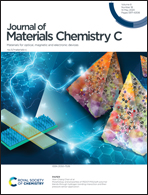Azobenzene molecular glasses with tuned glass transition temperatures: from optimal light-induced motion to self-erasable gratings†
Abstract
The rate of photomechanical formation of surface relief gratings (SRG) in thin films of azobenzene materials depends on their glass transition temperature (Tg), with an optimal Tg around 50–60 °C yielding the fastest SRG growth. Herein, the SRG growth of five analogous Disperse Red 1 molecular glasses with Tg values ranging from 9 to 71 °C was studied with two different laser wavelengths (488 and 532 nm). It was found that the optimal Tg for SRG growth increases with laser irradiance, from approximately 50 °C at 100 mW cm−2 to over 70 °C at 300 mW cm−2. Furthermore, the azobenzene glass with a sub-ambient Tg of 9 °C can inscribe self-erasable gratings that collapse spontaneously when irradiation is stopped in a repeatable fashion, thereby paving the way for light-controlled optical devices.



 Please wait while we load your content...
Please wait while we load your content...